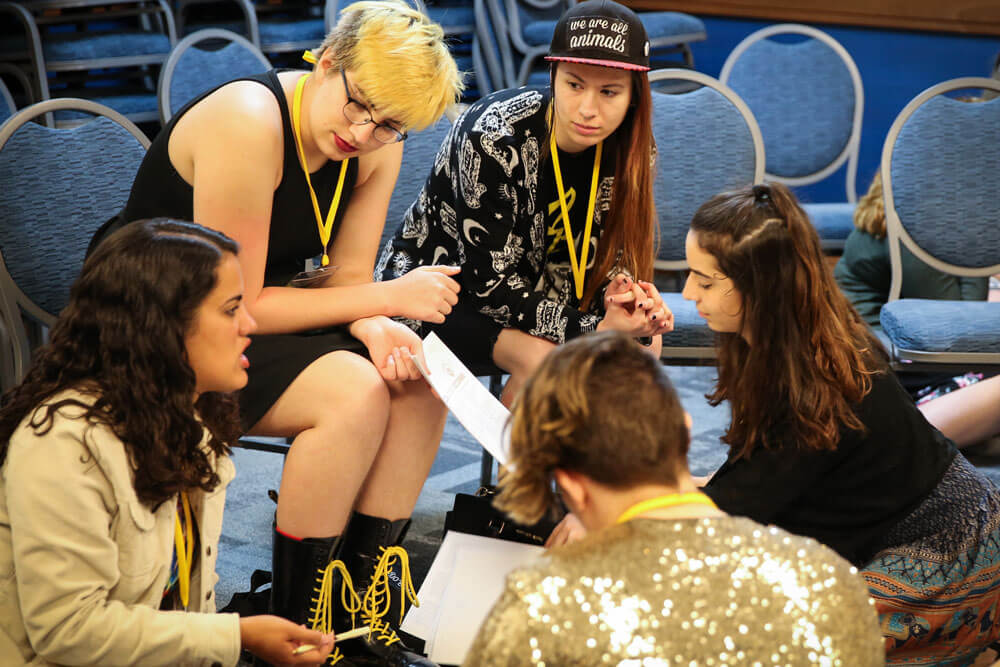Discussion Guidelines
Hateful rhetoric often occurs in private conversations or in the comments section of social media with friends, family, and neighbors.
You can make a difference starting with educating and pushing back against fear, hate, and bigotry in your own personal interactions.
Utilizing the talking points on this page and in the toolkit on welcoming refugees, rejecting anti-Muslim hate, and denouncing human rights violations and war crimes, you can make a difference in your circles by engaging those around you to counter fear, hate, and bigotry.
Here are some guidelines for these tough conversations.

1. Assess The Situation
- Are you able to safely engage with the problematic statement or behavior?
- Is this person willing to engage with you?
- Are you able to identify what the problematic statement or behavior is?
- Do you have the capacity and energy to address their problematic statement or behavior?
- Will engaging with this person foster meaningful interaction? If so, proceed to the next step.
2. Address The Statement or Behavior
Calmly question the offending party around their statement. Make sure to only address the statement or behavior and not the person.
USE: “The statement that you made was offensive and outright bigotry.”
DO NOT USE: “You are hateful and ignorant.”
The former opens up space for conversation. The latter closes space, fosters resentment and corners the offending party.
[Here are examples of questions to address problematic statements and/or behaviors]
- “What you just said made me feel really uncomfortable, what did you mean when you said ____”
- “I don’t think I correctly understood what you meant, what does ___ mean?
- “Can you help me understand what you meant to say when you said ___”
- “Can you explain your viewpoint to me?”
3. Be Ready For Defensiveness
When addressing oppressive statements or behaviors, the offending party will usually respond back in a defensive posture. Be ready to listen to them but at the same time hold them accountable for the impact of their actions.
Here are some typical responses to being called out/in:
- “You’re being too sensitive.”
- “Why are you defending ‘those’ people?”
- “Are you a terrorist or something?”
- “You must hate America.”
- “Don’t try to censor my freedom of speech.”
Each of these responses are rooted in fear, ignorance and insecurity. You do not want to engage or escalate from that frame. Rather continue to question more intently and to interrogate the underlying bigotry in their initial statement.
Here are some questions and statements that can help foster a place of understanding with the offending party:
- “I am sensing defensiveness in your voice, where is that coming from?”
- “It’s clear that you have some very strong opinions, can you help me understand where and how these opinions are being formed?”
- “What you said was really offensive and hurtful, why do you feel that way?”
- “I know that you are not a hateful person, why do you insist on holding on to such hurtful statements?”
4. Bridge The Interaction to Action
After having spent your time and energy engaging with this person you are going to want to make sure to conclude the conversation in a way that informs them clearly about the impact of their behavior and provide them with the opportunity to educate themselves.
Here are two likely outcomes that you can prepare for:
- Dismissal
In this situation, there is little to be gained in continuing the interaction. In these instances, you’ve planted a seed of inquiry and reflection that will hopefully cultivate into introspective remorse, guilt and finally openness to changing their behavior.
- Acceptance
In this scenario, the offending party has either partially or fully apologized for their behavior and are open to changing it. This is an opportunity for you to provide them with resources to educate themselves, such as the “Reality Check” portion of this toolkit. It is important for you to shepherd this relationship and help them move away from guilt into becoming a true ally.
This is not a process that happens overnight and it isn’t one that ever truly ends. But the most important thing to note is that it needs to start somewhere and it will start with you.
